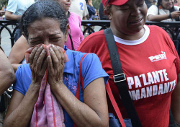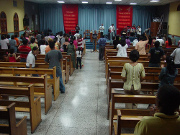 |
| (Cover photos by GloboVision. Story photo by David Seaton) |
Venezuela (MNN) ― Venezuelans began seven days of public mourning on Tuesday night following the death of their president, 58-year-old Hugo Chavez, after a long battle with cancer.
His hand-picked successor, vice-president Nicolás Maduro, said Chavez would be given a state funeral in Caracas on Friday. In the meantime, Maduro will act as interim president and run for the office in the upcoming election in the next 30 days. The Voice of the Martyrs Canada spokesman Greg Musselman says of Maduro, "He was very loyal to Hugo Chavez. We've seen a consolidation among left-leaning Latin American countries, so there is the belief that he will continue on in the same way that Hugo Chavez had."
Venezuela's constitution specifies that the speaker of the National Assembly should assume the interim presidency if a president can't be sworn in, but Chavez made his wishes known before he died. Government officials are following the plan he outlined at that time.
Maduro is also warming up to his role. He called out unnamed "enemies" he claimed were trying to undermine Venezuela's government in a speech Tuesday. Then, he expelled an American Air Force attaché at the U.S. embassy for spying. There's rumor that government officials blame the United States for the death of Chavez.
The big question now is: will there be a huge change? Not likely. "Chavism" is expected to reign on. Musselman explains, "He's a guy that does hold to the socialist ideology. We don't expect things to change drastically for the evangelical Church when it comes to evangelism and freedom to gather."
From what Venezuelan Christians report, Musselman says in the 14 years he was in office, "Chavez may have had his points of trying to help the poor and some of those things which we say are great. But ultimately, he didn't deliver on everything that he promised. Some would say the country is a lot worse."
The "worse" Musselman is referring to is the loss of freedoms. "When you start preaching the Bible--that there's one King and one Kingdom (the Kingdom of God), and not the government of a dictator (as we see with Hugo Chavez), the Christians run into difficulty."
Soon, that turned into a kind of subtle oppression. Musselman spoke with a prominent church leader in Venezuela: Nelson Castro (no relation to Cuba's Fidel Castro), a former colonel who served with Hugo Chavez, confirms the undercurrents. "There has been that pressure turned on them, in terms of them getting radio stations licenses, to be able to spread the Gospel, to be able to expand the Church and a lot of what was happening he said, was very much parallel to what had happened in Cuba under Fidel Castro."
In 2009, the human rights situation in Venezuela was beginning to deteriorate. There were reports that the regime was considering confiscating churches, schools, and other religious buildings. That same year, Venezuela was added to the U.S. Commission on International Religious Freedom Watch List.
Three years later, the country remains on the list along with Afghanistan, Belarus, Cuba, India, Indonesia, Laos, Russia. and Somalia. According to the USCIRF, "The Watch List provides advance warning of negative trends that could develop into severe violations of religious freedom, thereby providing policymakers with the opportunity to engage early and increasing the likelihood of preventing or diminishing the violations."
From the USCIRF report segments involving Venezuela, the report added more rights violations including:
*the government's failure to investigate and hold accountable perpetrators of attacks on religious leaders and houses of worship,
*rhetoric from President Hugo Chavez, government officials, state media, and pro -Chavez media directed at certain faith-based communities.
"Definitely, the Church has been in defensive mode under Chavez, and it has been getting more intense over the past few years," notes Musselman, while at the same time acknowledging that the Constitution of Venezuela provides for freedom of religion, and there are no official restrictions on religious practice.
Religious groups are required to register with the Directorate of Justice and Religion (DJR) in the Ministry of Interior and Justice, and so far, no groups were refused registration in the past few years.
Still, Musselman goes on to say, the actions of Chavez created a hostile ministry environment. "If things had continued to progress the way that things had been under Hugo Chavez, it would become more and more difficult getting better jobs and education, because anybody that was not for him was against him."
By law, Venezuela will hold elections in the next 30 days. So far, there isn't a candidate strong enough to challenge the government frontrunner. In light of that, Musselman urges believers to "pray that the church leaders [and] Christians that are serious about evangelizing and sharing the Gospel of Jesus Christ would continue to remain devoted to the Lord, (that) they would not be intimidated."
